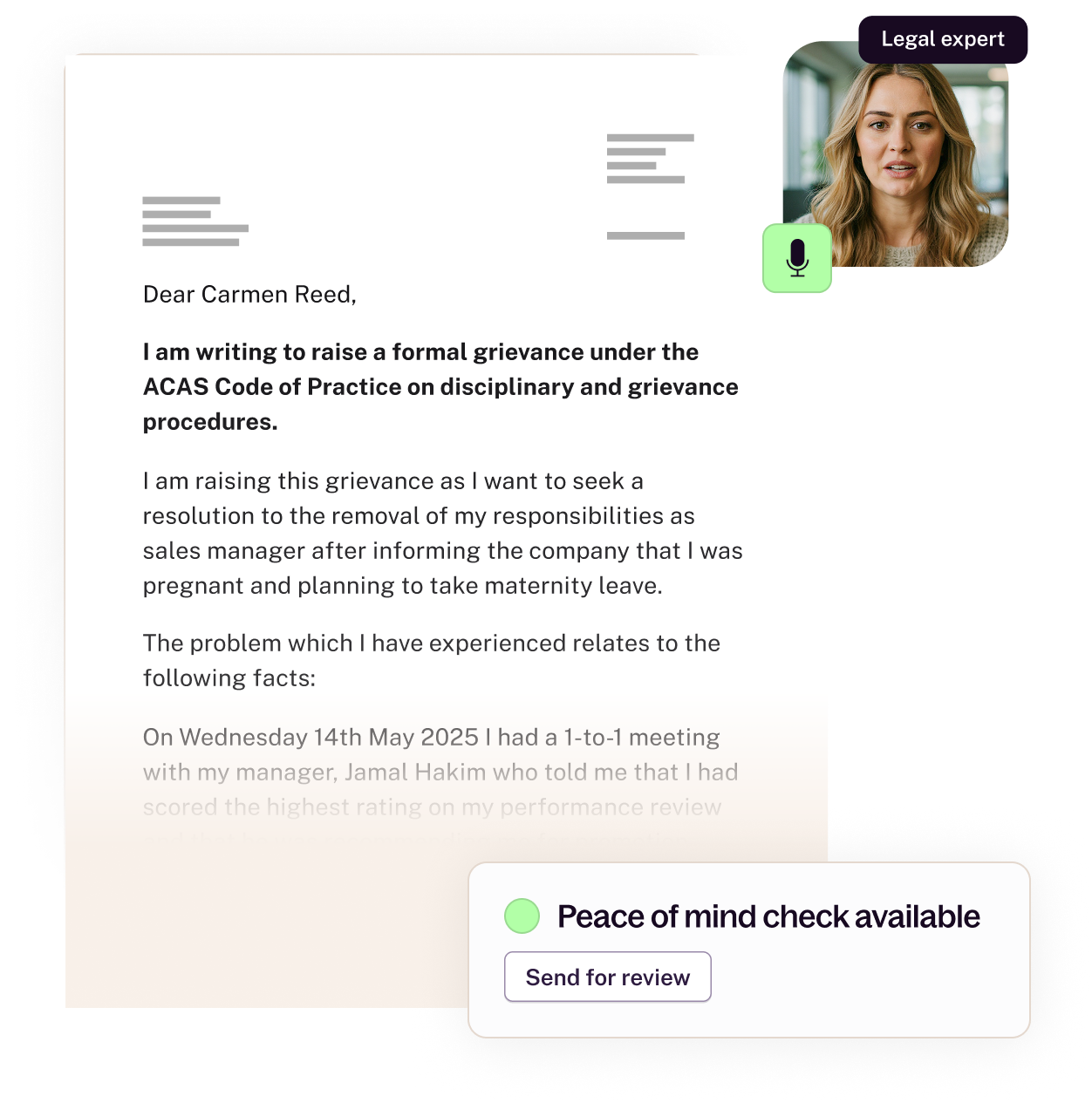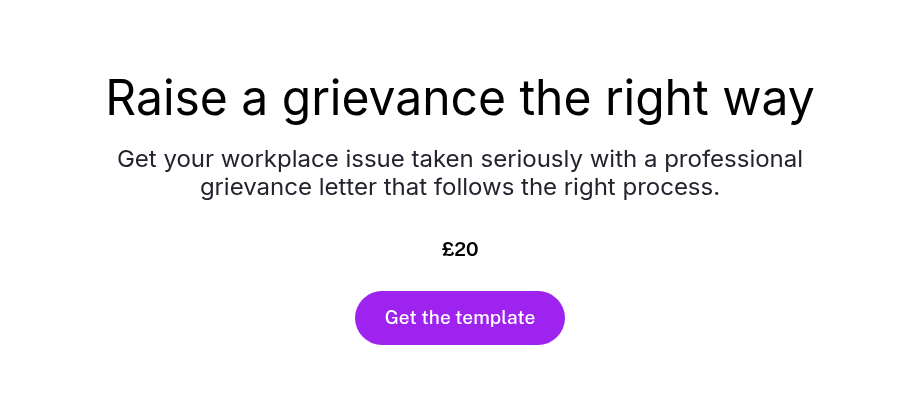"I would recommend Valla to anyone needing to know what to do from first grievance through to taking out a claim and beyond."
- Lorraine Buckley
"Used the grievance letter template and found it helpful to formulate my thoughts, and helpful prompts. Good layout to make it professional. Paid extra for review and the comments were very good and gave me reassurance to submit to my manager."
- Timothy
" I came across Valla when I started having problems at work and without the knowledge they gave me I wouldn’t be able to fight for my rights like I am now."
- Renata
Frequently asked questions
Do I have to raise a grievance before I can go to an employment tribunal?
In most cases, yes. Tribunals expect you to try resolving issues through your employer’s formal grievance procedure first. It shows you've taken reasonable steps before escalating.
However, there are some circumstances when you might not want to raise a formal grievance first, for example if:
- the working relationship with your employer has completely broken down
- there is no senior person in your company who you trust to be impartial
- you have already left the employer (although you can still raise a grievance in these circumstances, your employer may not deal with it)
What should I include in a grievance letter?
Stick to the key facts: what happened, when, where, who was involved, and what you want to happen next. We walk you through this so nothing important gets missed.
What happens after I send a grievance to my employer?
Your employer should follow a formal grievance process, including investigating your complaint and providing a written response. If they fail to do this, it may affect your legal rights later.
Can I raise a grievance while still employed?
Yes. In fact, raising a grievance while you’re still working there is usually the best approach. It gives your employer a chance to resolve the issue internally.
Is my grievance letter confidential?
Your grievance should be handled confidentially, but it may be shared with people who need to know, like HR or senior managers involved in the investigation.
What if my employer ignores my grievance?
If you don’t get a response, or you feel the outcome is unfair, you may be able to take things further, including bringing a claim to an employment tribunal. Valla can help you understand your next steps.
Can I raise a grievance about something that happened months ago?
Yes, but the sooner the better. Delays may make it harder to investigate, and some legal claims have strict time limits, usually three months less one day from when the incident happened.
Can I raise a grievance without legal representation?
Absolutely. You don’t need a lawyer to raise a grievance. Valla gives you the tools and guidance to do it yourself, clearly, confidently, and in line with UK employment law.
How long should my grievance letter be?
There’s no fixed length, but err on the short side. The best grievance letters are clear and concise with just enough detail to explain what happened and what you want to change. Valla’s tool helps keep it focused and effective.
Can I raise a grievance while off sick or on leave?
Yes. You can raise a grievance even if you're off work due to stress, illness, or maternity/paternity leave. Your employer is still required to handle it fairly and respond appropriately.
What is a workplace grievance and why raising one matters
What is a grievance at work?
A workplace grievance is a formal complaint that you raise with your employer when something at work isn’t right. This could be anything from bullying or harassment, to discrimination, unpaid wages, health and safety concerns, or a breach of your employment contract.
In the UK, all employers must have a grievance procedure that allows employees to raise issues officially and seek a resolution. The minimum grievance process that you and your employer employer must follow is outlined in the Acas Code of Practice for Grievances and Disciplinaries. If your employer hasn't given you a grievance process, you can follow this guide.
If you've raised an issue informally and it hasn't been resolved, a well-written grievance letter is the next crucial step in this process, and it’s often required if you later decide to escalate the issue through an employment tribunal.
Why raising a grievance matters
Raising a grievance isn’t just about being heard, it protects your rights. It creates a written record of what’s happened, shows that you’ve tried to resolve the issue through the proper internal channels, and can help strengthen your case if legal action becomes necessary.
Many workers hesitate to speak up because they’re unsure how to write a grievance letter or what to include. But failing to raise a formal grievance could make it harder to hold your employer accountable later. That’s why Valla makes it easy to raise a grievance the right way, with tools built specifically for UK employment law.
How It Works: Raise a Grievance at Work with Valla in 5 Simple Steps
Raising a grievance doesn’t have to be overwhelming. At Valla, we break it down into a few easy steps so you can submit a formal complaint to your employer with confidence.
Whether you’re dealing with workplace bullying, discrimination, unfair treatment or a breach of contract, we help you write a grievance letter that follows UK employment law, and gets taken seriously.
Here’s how our process works:
Step 1: Tell us what happened
Answer a few straightforward questions about your situation. We’ll ask what’s gone wrong at work, whether it’s harassment, unpaid wages, discrimination, or something else that breaches your rights as an employee.
Step 2: We generate your grievance letter
Based on your answers, we automatically build a clear and professional grievance letter. It’s structured in the way employers and employment tribunals expect to see.
Step 3: Review and personalise your letter
You can edit, adjust or add extra details to make sure the letter reflects your experience. We make it easy to include dates, evidence, and the outcome you’re asking for.
Step 4: Get optional support from a legal coach
Want expert eyes on your letter? For an additional charge, our qualified UK legal experts can review your grievance letter and give you tailored feedback or help you prepare for next steps.
Step 5: Send it to your employer
Download your letter and send it to your employer by email or post. We’ll remind you to keep a copy and track any response, just in case the issue needs to be escalated.
Why Use Valla to Raise Your Grievance
Thousands of people across the UK have used Valla to raise a grievance at work because it’s fast, clear, and built around your rights as an employee.
Here’s what you get when you use Valla’s grievance letter tool:
- Step-by-step help to raise a grievance professionally
- Grievance letter template tailored to UK employment law
- Avoid common mistakes that can lead to your grievance being ignored
- Make your case clearly, using language employers take seriously
- Optional UK legal expert support to review your letter
- Keep a record of your complaint for future legal action if needed
- No legal jargon. Just clear, practical guidance
- Free to get started, with affordable upgrade options
- Free access to Valla's platform to track and manage your case
Whether you’re still working for your employer or have already left, Valla gives you the tools to raise a workplace grievance the right way, without stress, confusion, or unnecessary legal fees.





